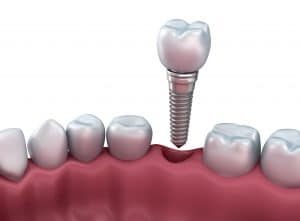 Once a tooth is lost, the effects seem obvious. Depending on where the tooth was along your dental ridge, it might be more or less obvious to others when you smile. However, it’ll be hard to miss the gap every time you brush and floss your remaining teeth, or run your tongue over them. Despite the immediately noticeable impacts of losing a tooth, though, there are several less obvious impacts that make the benefits of dental implants more profound than you might realize. Designed to mimic your lost teeth roots, implants don’t just fill the gap in your smile; they also help reestablish all that your smile has lost along with your tooth and its root.
Once a tooth is lost, the effects seem obvious. Depending on where the tooth was along your dental ridge, it might be more or less obvious to others when you smile. However, it’ll be hard to miss the gap every time you brush and floss your remaining teeth, or run your tongue over them. Despite the immediately noticeable impacts of losing a tooth, though, there are several less obvious impacts that make the benefits of dental implants more profound than you might realize. Designed to mimic your lost teeth roots, implants don’t just fill the gap in your smile; they also help reestablish all that your smile has lost along with your tooth and its root.
What you’ve actually lost
The roots of your teeth have more than one purpose. Stabilizing your teeth’s crowns is one; as you bite and chew, the roots remain firmly within your jawbone, keeping your teeth steady and unmoving. Another, lesser known function is to preserve the health and integrity of your jawbone structure. This structure supports your teeth not just by securing their roots, but also by sending them nutrients through the root canals within them. Every time you bite and chew, your teeth roots stimulate your jawbone and tell your body how many teeth it retains. Your body responds by sending an ample supply of nutrients for your jawbone to adequately support them.
How this affects your smile
When you lose a tooth and its root no longer stimulates your jawbone, your body will stop sending the nutrients it has allocated for that tooth. Instead, it will send them somewhere else, where your body can use them more efficiently. Unfortunately, this can leave your jawbone without adequate nutrition, which is why you may experience jawbone erosion (or loss of mass and density) following tooth loss. Over time, this can leave your jawbone weak and less secure, making it more likely that you’ll lose more teeth further down the road.
What implants do to correct it
These long-term effects of tooth loss can largely be traced back to the loss of your healthy, natural teeth roots. Therefore, the best way to avoid these consequences is to replace them, which is only possible with the help of an appropriate number of dental implants. Made to mimic your healthy teeth roots, dental implant posts are inserted into your jawbone, then used as foundation support to stabilize your dental crown, bridge, or denture. This helps maintain the stimulation your jawbone needs to keep receiving enough minerals and nutrients, while also offering more comfortable and realistic support for your new teeth.
Face tooth loss confidently with implants
To fully understand the benefits of dental implants, you should understand what tooth loss does to your smile and what implants do differently than other dental prostheses. To learn more, call the James Stewart, DDS, dental implant office in Livonia, MI, at (734) 425-4400. We also serve the residents of Farmington, Plymouth, Dearborn Heights, and all surrounding communities.




Recent Comments